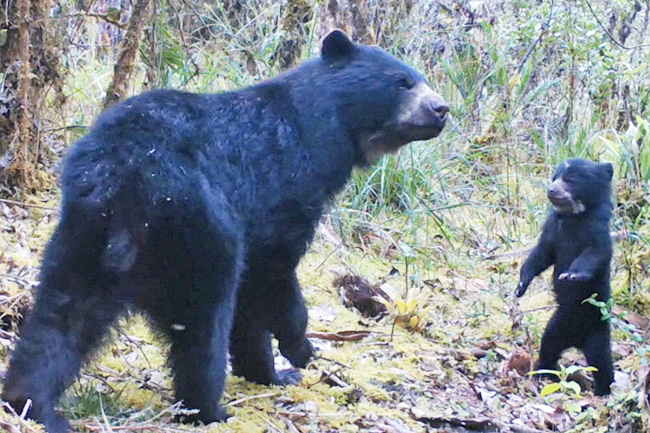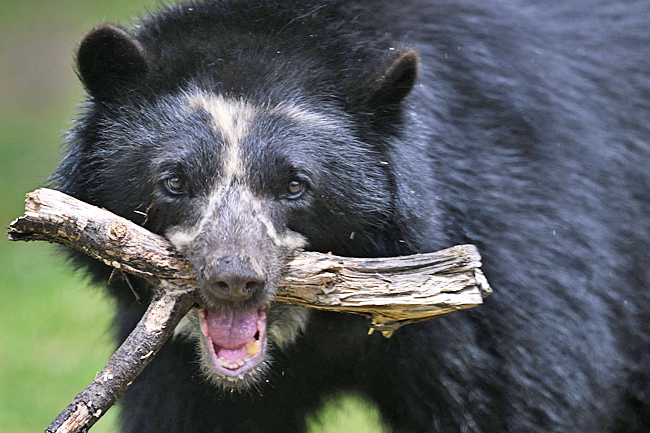EL AGUILA, COLOMBIA (AFP) – In a coffee-growing region of Colombia, the world’s third-largest producer, a group of farmers have declared a truce with an indigenous inhabitant they once hunted but now hail – the Spectacled Bear of the tropical Andes.
Calling a halt to their forest encroachment, the farmers are instead sacrificing parts of their land for the benefit of South America’s last surviving bear species, believed to have been the inspiration for the popular children’s book character Paddington Bear.
“The bear saved us,” Julian Pinilla, 37, told AFP on his farm in El Aguila, in Colombia’s western Valle del Cauca department.
He and nine neighbours are participants in a programmes called Conservamos la vida (We preserve life) that provides help and resources for farmers in exchange for bear protection.
“We gave part of our farm for conservation and we see that the forest has increased as well as the species that live there,” said Pinilla. “We no longer have so much conflict.”
Pinilla has contributed 28 hectares of the land his family has farmed for generations.
All the neighbours together have given up about 400 hectares, part of a larger swath of 3,000 hectares put aside for the Spectacled Bear in the so-called Western Range of the Colombian Andes.


Also known as the Andean Bear, the omnivorous animal is native to the mountain range – all the way from Argentina to Venezuela.
In the hit children’s book and film series, marmalade-loving Paddington Bear originally hails from the jungles of Peru.
But while Paddington is a beloved fictional character, the real Spectacled Bear was long perceived as a threat by farmers: ruining crops and even killing cattle as it is forced to roam and feed beyond its ever-shrinking habitat.
Thanks to Conservamos la vida, farmers like Pinilla now have nothing but praise for the bear that can be either black or dark brown, and whose white markings around its eyes account for its name.
In return for bear protection, participants receive materials they need for coffee growing and processing, animal feed, infrastructure such as water treatment and septic tanks, and help fencing in their domesticated animals – out of reach of hungry bears.
Another benefit has been the creation of Cafe Oso Andino (Andean Bear Coffee) – an export label that has created many jobs in the region, according to project leaders.
Spectacled Bears are classified as vulnerable on the International Union for Conservation of Nature (IUCN) Red List of threatened species.
Conservation group WWF estimates that in 2017 there were about 8,000 bears left in Colombia.
Spectacled Bears are somewhat smaller than the bears of Europe or North America, standing between 1.3 metres (m) and 1.9m tall and weighing between 80 kilogrammes (kg) and 125kg.
They eat mainly fibrous vegetation and fruit, but also occasionally meat.
Often slaughtered in retaliation for killing livestock or ruining crops, the bears are also sometimes targeted for ritual or medicinal purposes or for trade, according to the IUCN. Live bears are sometimes captured and sold.
“It is not known how many… are lost each year,” said biologist with the Wildlife Conservation Society, Mauricio Vela-Vargas, one of the bodies behind the conservation project launched in 2015.
Actual bear numbers may be lower than thought, he told AFP, and in many areas they are still at risk of violent encounters with their Number One enemy: humankind.
A case in point is the Chingaza National Natural Park near Bogota, where thousands of tourists flock every year in the hopes of spotting a Spectacled Bear.
“This population does not have much of a future,” said Director of the Wii Foundation, Daniel Rodriguez, so called after an indigenous name for the bears that roam freely in the park but sometimes leave in search of food and get killed in areas inhabited by humans.
Park official Yulieth Alvarado told AFP that sensitisation efforts were underway so people near the park “can understand the importance of the species and also be our allies in conservation’’.
Spectacled bears are considered an umbrella species whose protection tends to indirectly benefit others that share its habitat.






